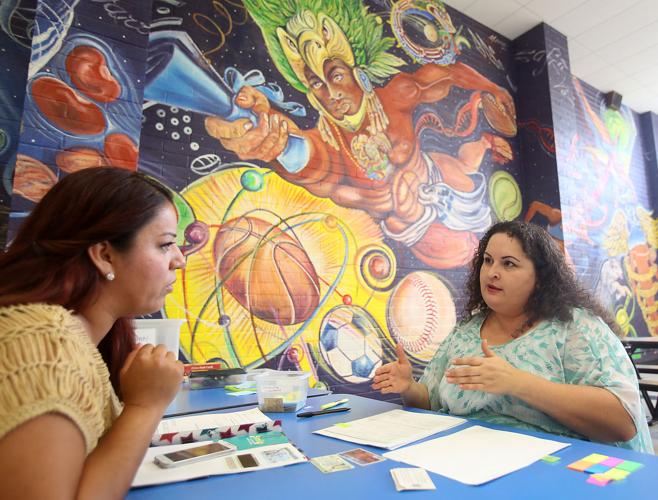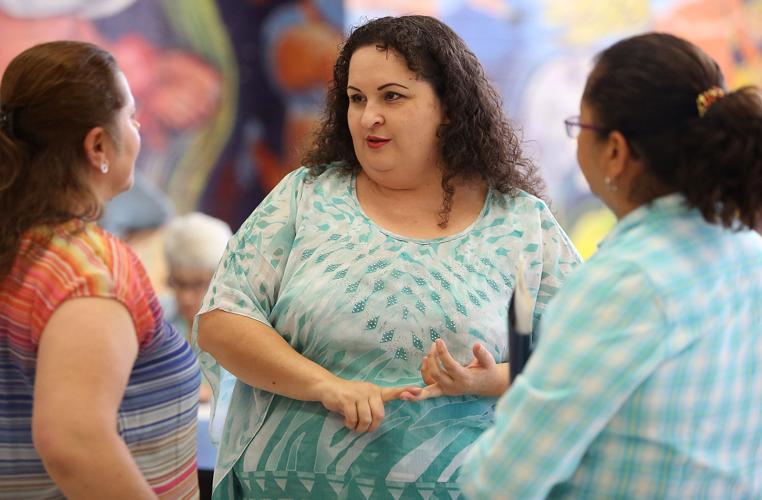Hours after the news broke Thursday from the Supreme Court that sent shock waves across the country’s millions of undocumented immigrants, Silvia Herrera sat at a weekly citizenship workshop in the cafeteria of Tucson’s Pueblo Magnet High School.
She was helping Magda Hoskins fill out the complicated 20-page application for citizenship.
“I do this with my heart,” said Herrera, noting that in this particular day it felt heavy.
An evenly split Supreme Court left standing an appeal court’s ruling against President Obama’s 2014 expanded immigration plan that protects up to 4 million undocumented immigrants, who have no criminal history, from deportation and allows them to legally work in this country. The executive action, called Deferred Action for Parents of Americans and Lawful Permanent Residents, or DAPA, benefited undocumented parents of citizens or of lawful permanent residents.
Herrera was hoping to qualify for the program. But in the wake of her abandonment by the courts and Congress, the married mother of two was left disillusioned, frustrated and uncertain.
“I broke down and cried when I heard the news,” said Herrera, 41, who has lived in Tucson with her husband for 18 years. “What’s going to happen?”
That’s the question for millions of hardworking people who came to this country to support our economy, to raise their families and give them an education and opportunities. This country will continue to punish her with the threat of deportation and separation from her family.
“I do not belong in Mexico. We work here. We pay taxes, even though people believe that we do not,” Herrera said. “We cannot plan our future like regular people because our future is in other people’s hands.”
She and her husband came to Tucson from Ciudad Obregón, in southern Sonora. They both worked in a factory for low wages and they struggled in a deflated economy.
The couple and their baby daughter came to Tucson to live in the same city as her brother-in-law. Her husband found work as a bricklayer and she cooked in a restaurant.
“We are poor here,” Herrera said, “but in Mexico we were very poor.”
Her husband and his brother now have their own masonry business. They bought a manufactured home and the family has three cars. The Herreras have a 15-year-old high schooler who was born here. Their 18-year-old daughter, who recently graduated from a nursing assistant program, is a dreamer. That 2012 program shields younger undocumented people from deportation and allows them to work legally. The program, called DACA, Deferred Action for Childhood Arrivals, was not affected by the high court’s impasse.
“Although it has been difficult, we have lived a dignified life,” Herrera said.
While uncertainty will continue to inflict worry for the family, Silvia Herrera remains committed in helping others become naturalized citizens.
For the past 18 months, Herrera has worked long hours as a volunteer with Keep Tucson Together, a community group that advocates for undocumented immigrants and their families. Each Thursday evening at Pueblo High School, Herrera and other volunteers, including lawyers, guide and advise Tucsonans how to file for citizenship and DACA. They also help clients pass citizenship exams.
Herrera said that as more immigrants become citizens, her situation has the potential to change for the better. She said the failure of Congress to enact comprehensive immigration reform and the halt to Obama’s DAPA program makes the November election even more critical.
“Every person that I help with their citizenship is a new voter,” she said.
That includes Consuelo Lemus.
She and her husband, Erasmo Lemus, arrived with a chocoflan cake for Herrera. It was a gift to show Herrera their heartfelt appreciation for her assistance in helping Lemus pass her citizenship test.
“We are grateful to her,” said Erasmo Lemus, a restaurant manager, a U.S. citizen and registered voter. His wife will take her oath July 8 and will register to vote as well.
Herrera said she is an activist for full civic participation. She tells the people whom she helps that it is their responsibility to pay it forward for others.
“If you want to do something for me and for my daughter, I tell people they need to vote,” said Herrera.





